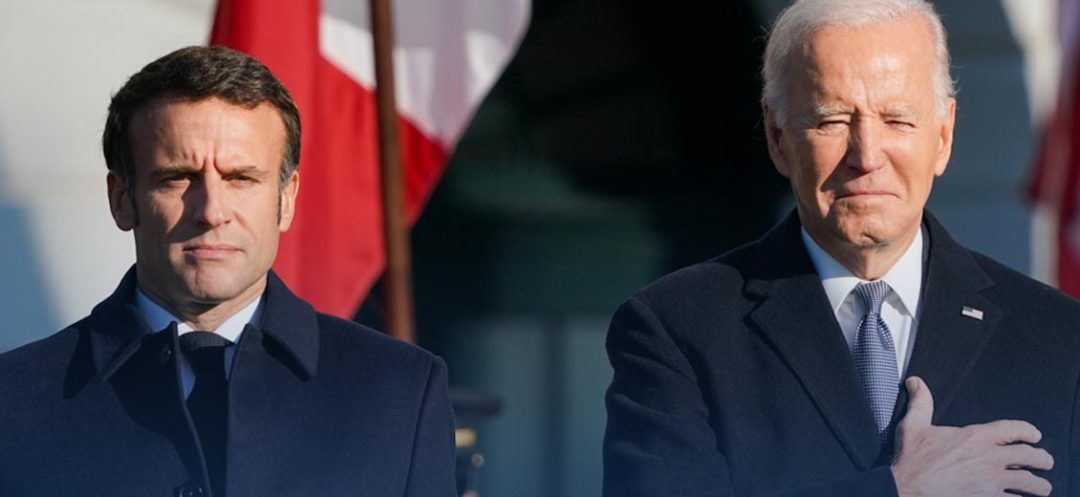- Home
- War in the Middle East
- The US and France Call for a 21-Day Ceasefire Between Israel and Hezbollah

As intense Israeli military strikes continued throughout Wednesday night and are still underway on Thursday morning, the United States and France called for a temporary 21-day ceasefire between Israel and Hezbollah to pave the way for broader negotiations, while UN Secretary-General António Guterres told a UN Security Council meeting that “all hell is breaking loose” in Lebanon.
Israel's Army Chief of Staff, Herzi Halevi, had said on Wednesday that his country was preparing for a possible ground operation.
The situation in Lebanon has become "intolerable" and "is in nobody's interest, neither of the people of Israel nor of the people of Lebanon," said a joint statement released by the White House.
This joint appeal is an “important breakthrough," commented a senior US official, hoping that it will also “stimulate” talks for a truce and the release of hostages in the Gaza Strip.
French Foreign Minister Jean-Noël Barrot was the first to raise the call for a 21-day truce earlier in the day at an emergency meeting of the UN Security Council.
A war between Israel and Hezbollah “is not inevitable," he insisted, if all players commit themselves “resolutely” to a peaceful solution to the conflict. Barrot is expected in Lebanon at the end of this week.
The US said the 21-day period had been chosen to give space to negotiate a more comprehensive agreement between the two sides to allow residents to return to their homes along the Israel-Lebanon border without fear of further violence or an attack similar to that of October 7 in the future.
The joint statement issued by US President Joe Biden and French President Emmanuel Macron said: “It is time to reach a settlement on the border between Israel and Lebanon that guarantees security for civilians to return to their homes. The exchanges of fire since October 7, and in particular over the past two weeks, threaten a much wider conflict and harm civilians.”
The two leaders, who met on the sidelines of the UN General Assembly in New York, said they had worked on a temporary ceasefire “to give diplomacy a chance to succeed and avoid further escalations on either side of the border.”
This move was also backed by Australia, Canada, the European Union, Germany, Italy, Japan, Saudi Arabia, the United Arab Emirates, and Qatar and urged Israel and Lebanon to support it.
The announcement was made after a stormy meeting of the UN Security Council, during which the Caretaker Prime Minister accused Israel of violating his country's sovereignty. Najib Mikati declared that the Lebanese health system was functioning over capacity.
Najib Mikati declared that Lebanon was facing a flagrant violation of "its sovereignty and human rights by Israel's brutal practices.”
He added that he hoped to be able to leave the UN session with a “serious solution” to “put pressure on Israel to achieve an immediate ceasefire on all fronts.”
Israel said it welcomed diplomacy but did not commit to a ceasefire, vowing to pursue its goal of degrading Hezbollah.
Iranian Foreign Minister Abbas Araghchi warned that Tehran, which in recent weeks has held back on retaliatory strikes on Israel after attacks targeting Iranian interests, may no longer be restrained.
"The region is on the brink of a full-scale catastrophe. If unchecked, the world will face catastrophic consequences," he told reporters.
Neither Lebanon nor Israel has accepted the proposal, although the US is in contact with both governments. Official responses are expected in the coming hours.
The United States is negotiating with the Lebanese government. It would then be up to the Lebanese government to engage in dialogue with the “non-state actors” (Hezbollah). And it is in this perspective that we can better understand the statement given by the Speaker of Parliament, Nabih Berri, who declared on Wednesday that the next 24 hours would be decisive in trying to achieve a diplomatic solution between Israel and Hezbollah.
Israel's Army Chief of Staff, Herzi Halevi, had said on Wednesday that his country was preparing for a possible ground operation.
The situation in Lebanon has become "intolerable" and "is in nobody's interest, neither of the people of Israel nor of the people of Lebanon," said a joint statement released by the White House.
This joint appeal is an “important breakthrough," commented a senior US official, hoping that it will also “stimulate” talks for a truce and the release of hostages in the Gaza Strip.
French Foreign Minister Jean-Noël Barrot was the first to raise the call for a 21-day truce earlier in the day at an emergency meeting of the UN Security Council.
A war between Israel and Hezbollah “is not inevitable," he insisted, if all players commit themselves “resolutely” to a peaceful solution to the conflict. Barrot is expected in Lebanon at the end of this week.
The US said the 21-day period had been chosen to give space to negotiate a more comprehensive agreement between the two sides to allow residents to return to their homes along the Israel-Lebanon border without fear of further violence or an attack similar to that of October 7 in the future.
The joint statement issued by US President Joe Biden and French President Emmanuel Macron said: “It is time to reach a settlement on the border between Israel and Lebanon that guarantees security for civilians to return to their homes. The exchanges of fire since October 7, and in particular over the past two weeks, threaten a much wider conflict and harm civilians.”
The two leaders, who met on the sidelines of the UN General Assembly in New York, said they had worked on a temporary ceasefire “to give diplomacy a chance to succeed and avoid further escalations on either side of the border.”
This move was also backed by Australia, Canada, the European Union, Germany, Italy, Japan, Saudi Arabia, the United Arab Emirates, and Qatar and urged Israel and Lebanon to support it.
The announcement was made after a stormy meeting of the UN Security Council, during which the Caretaker Prime Minister accused Israel of violating his country's sovereignty. Najib Mikati declared that the Lebanese health system was functioning over capacity.
Najib Mikati declared that Lebanon was facing a flagrant violation of "its sovereignty and human rights by Israel's brutal practices.”
He added that he hoped to be able to leave the UN session with a “serious solution” to “put pressure on Israel to achieve an immediate ceasefire on all fronts.”
Israel said it welcomed diplomacy but did not commit to a ceasefire, vowing to pursue its goal of degrading Hezbollah.
Iranian Foreign Minister Abbas Araghchi warned that Tehran, which in recent weeks has held back on retaliatory strikes on Israel after attacks targeting Iranian interests, may no longer be restrained.
"The region is on the brink of a full-scale catastrophe. If unchecked, the world will face catastrophic consequences," he told reporters.
Neither Lebanon nor Israel has accepted the proposal, although the US is in contact with both governments. Official responses are expected in the coming hours.
The United States is negotiating with the Lebanese government. It would then be up to the Lebanese government to engage in dialogue with the “non-state actors” (Hezbollah). And it is in this perspective that we can better understand the statement given by the Speaker of Parliament, Nabih Berri, who declared on Wednesday that the next 24 hours would be decisive in trying to achieve a diplomatic solution between Israel and Hezbollah.
Read more



Comments